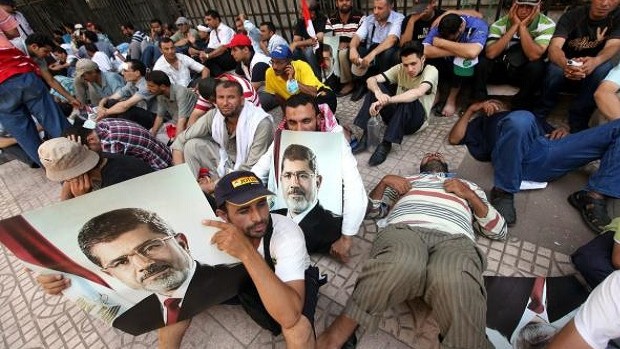What hurts Egypt’s Muslim Brotherhood the most is not the army, not the Tamarod (Rebellion) movement, not the Al-Azhar institution, nor even the 22 million Egyptians who allegedly supported the toppling of former President Mohammed Mursi.
What hurts them the most is that the Salafists stood against them and sat among the audience that cheered Mursi’s ouster and interim president Adly Mansour’s appointment. What really hurts them is that the Salafists, until this day, continue to religiously and politically challenge them in the media.
The most important lesson learned from toppling Mursi is that there is not a single party that dominates in Egypt, and that hiding behind religion is not enough to quash people’s anger and their revolutions. It has become clear that the Egyptians are not owned by the Brotherhood, no matter how long their beards are or how many times they call their adversaries “infidels.” It has also become clear that the army does not dare sack an elected president without the support of a strong majority.
It has become clear that the Egyptians, as parties and individuals, cannot be categorized only as religious adherents and infidels. This is evident in the Salafists’ move to abandon the Brotherhood and join the Tamarod movement and the National Salvation Front (NSF). A year after their attempts to dominate, the Brotherhood found out that they failed because they rejected political participation.
Many mvoements and parties have important stock in the political market, which makes them a partner in Egypt’s governance even if they were not in government: The Brotherhood, the Salafist Nour party, the National Salvation Front, the Strong Egypt Party, the Al-Wasat (Center) Party, the April 6 movement, the Tamarod campaign and dozens of others.
Let us stop at the Salafist Nour Party. Who would have believed that the Salafists had a voice in Egypt and that they were a group capable of political activity?
They have become the surprise of the Egyptian arena, with their ability to work, manoeuver, develop their discourse and integrate pragmatically. I advise those who have not read their statement to do so. It’s a clever defense against Brotherhood accusations that they failed Mursi by siding with those who staged the coup.
The Salafist document says they agreed with the Brotherhood not to take to the streets on June 28, according to their vision that “the army would never abandon Mursi, while we thought that Mursi would never abandon the palace, but that it was possible that the army would side with the protesters if their numbers exceeded a certain figure, which was what happened.” Protesters at Rabaa Al-Adawiya played no role until the July 3 declaration was made.
The Salafists also noted how the Brotherhood manipulated their followers’ minds, accused them of vetoing the Bay’ah (oath of allegiance)—in its religious context—and claimed that elections were an act tantamount to Bay’ah and described their opponents as secularists and Christians.
In their document, the Salafists said if Mursi considered the elections to be the same as Bay’ah, then this meant he must adhere to the constitution. The constitution allowed protests and prohibited confronting those who took to the streets to protest against Mursi.
The Salafists also voiced surprise that the Brotherhood criticized them for meeting with secularists and Christians at a time when Brotherhood members themselves bragged that there were secularists and Christians with them at Cairo’s Rabaa Al-Adawiya.
Of course, such discussions are only fit for those engaged in religious political controversies. The general public wants stability, jobs and better living conditions—something that cannot be achieved through the ruling party’s exclusion of other political parties that participated with it in the revolution, in the elections and the course of political life.
Mursi’s sad ending, being ousted and detained, came amid celebrations from all other political parties. The streets across Egypt were packed with millions of people cheering the ouster of Mursi and his cabinet.
Recent events have shown that there is not a single party, be it the army, the liberals or the youth, that can alone mobilize the people during this phase. During Hosni Mubarak’s era, the Brotherhood claimed that more than 60 percent of the people supported them. After the revolution, they won with a weak majority after leftist and Nasserite parties voted for them. A year after their failed governance, it is impossible for the Brotherhood to garner what they attained a year ago.
What took place, in removing the elected president and the dangerous disruption of order, is a painful lesson to all political parties—not just the Brotherhood. Respecting the constitution and state institutions serves both the governor and those governed. Mursi and the Brotherhood annulled the original constitution and insulted the judiciary, only to discover that the people and the army surprised them by taking over power.
Now after their ordeal, they will be convinced of their need for a constitution that respects the rights of the people as well as the rights of the president. They will be convinced that they are paying the price for their stupidity, for not respecting the legitimacy that brought them to power.
